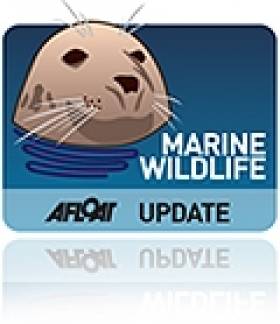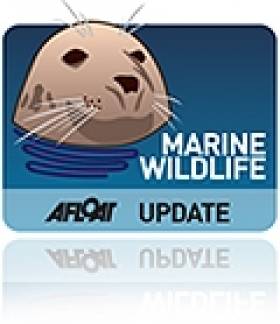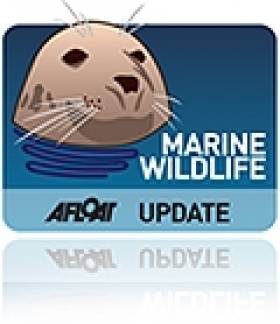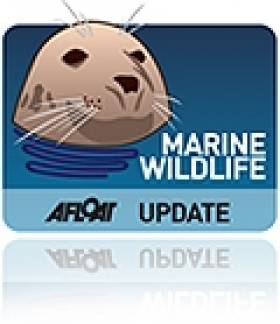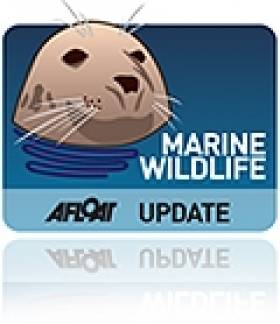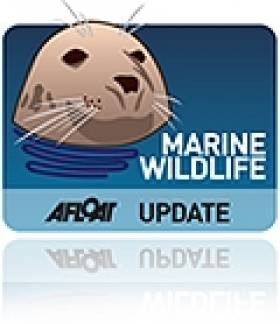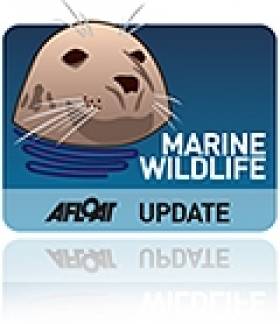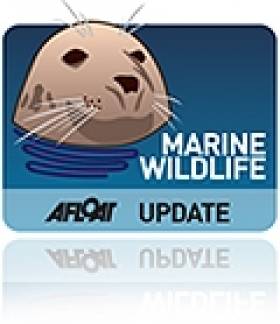Displaying items by tag: Dolphin
Rare Albino Dolphin Spotted In European Waters
#MarineWildlife - The Irish Mirror reports on marine researchers' extraordinary find of an albino bottlenose dolphin in the waters between Italy and Croatia.
Albus, as he has been named by the scientists, is one of only 20 known albino dolphins worldwide, and is believed to be the first spotted in the entire Mediterranean Sea.
The Irish Mirror has much more on the story HERE.
'Ireland's Ocean' is a major new four part ocean wildlife series for RTÉ One exploring the wonderful and diverse creatures that live in the seas around Ireland, from dolphins and sharks to plankton and the myriad of tiny colourful creatures that live in our shallow waters.
The series looks at the history of man's relationship with and response to the sea in Ireland, examining the common perception of creatures like dolphins and sharks ... are dolphins highly intelligent, sensitive creatures capable of healing sick children? Why are worrying numbers of dolphins washing up dead on our Atlantic coast? Are sharks terrifying animals waiting below the sea surface to eat us?
The truth transpires to be quite a surprise and leaves us with considerable food for thought. In other areas, the series takes us on a journey into wild and the colourful underwater world in the seas around Ireland, encountering an abundance of exotic creatures, many documented for the first time in this area.
Throughout the programmes, there is a strong sense of the interconnectedness of life, and natural balance within this world, as creatures depend on each other's presence to sustain life.
The first programme this Sunday takes a look at some of the 27,000 common dolphins living in Irish waters with scientists Dr Joanne O'Brien and Dr Simon Berrow.
The second programme, Sunday 29th June at 6.30pm gets up close with some of the 40 shark species and 30 ray species that live in Irish waters with Dr Maurice Clarke at the Marine Institute, as well as following the conservation efforts of Dr. Edward Farrell, Irish Elasmobranch Group, placing satellite tags on porbeagle sharks off Donegal, in a Marine Institute research programme.
Programme three focuses on life in the shallow seas around Ireland which are some of the most fertile on Earth. Storms churn up nutrients from the sea floor which combine with sunlight to create a fertile and abundant ecosystem.
The final programme looks at Ireland's ocean habitats.
Ireland's Ocean begins on Sunday June 22nd at 6:30pm on RTÉ One and runs for four weeks.
'Ireland's Ocean' was produced by Sea Fever Productions for RTÉ and financed under the Broadcasting Authority of Ireland's Sound & Vision scheme, and also by the Environmental Protection Agency.
#dolphinstrandings – As Afloat.ie reported earlier, a County Mayo woman Ina Kruger successfully rescued a stranded dolphin at Easter on Keem beach, Achill. Originally rescued on Easter Sunday, the dolphin returned to the beach where the body of a second dolphin was discovered. Fortunately, the second rescue attempt was more successful and the dolphin hasn't been seen since.
Dead Calf Linked To Doolin Dolphin
#MarineWildlife - The Irish Whale and Dolphin Group (IWDG) has confirmed that a dead dolphin calf found washed up near Doolin in Co Clare almost three years ago was likely born to Dusty the dolphin, who's been the subject of much controversy over recent weeks.
Dr Simon Berrow of the IWDG writes that a sample was taken from the dead calf and stored for future genetic analysis. Similar samples were collected from Dusty by local diver and award winning photographer George Karbus, and these were sent to marine researcher Marie Louis at the Centre d’Etudes Biologiques de Chizé, France as part of her PhD project.
Louis recently analysed these samples and determined that Dusty and the calf shared the same haplotype, a genetic marker that points to a very likely relation between the two dolphins.
"Given the recent behaviour of Dusty in Doolin and suggestions locally that she gets more aggressive when she is pregnant, this latest analysis is relevant as it shows that Dusty is sexually mature, interacts and mates with other dolphins and has at least on one occasion had a calf," writes Berrow.
Last week the victim of an attack by the 14-year-old female bottlenose dolphin at Doolin has called for a total swimming ban in the area.
Clare Photographer Nets Top Award for 'Surfing' Dolphin
#MarineWildlife - A fantastic snapshot of a surfing dolphin has netted a Clare-based photographer the prestigious top prize at the British Wildlife Photographer of the Year awards, as the Mail Online reports.
Czech-born George Karbus captured the winning image, titled 'In the Living Room', while diving off Ballintoy in Co Antrim, when he encountered the "playful" bottlenose dolphin "that suddenly started to surf the deep tube inside the waves".
As reported by TheJournal.ie, Karbus added: “Water visibility is always very limited in Ireland, and I was very lucky to get a shot like this.”
The photographer also topped the coastal and marine category at this year's awards, and his prize photo will be featured in a book compiling the top entries.
Karbus was previously featured on Afloat.ie in 2011 for his stunning images of fin whales and dolphins feeding off Hook Head in Co Wexford.
Doolin Dolphin Victim Calls For Total Swimming Ban
#DolphinAttack - A woman who suffered serious injuries after being struck by the snout of Doolin's dolphin resident Dusty has criticised the lack of warning signs in the harbour at the time.
As RTÉ News reports via the Irish Independent, Valerie Ryan is calling for a total swimming ban in the area after suffering eight spinal fractures, two broken ribs and lung damage in the incident on 28 July last.
The self-employed osteopath has been forced out of work for six months due to her injuries.
Hers was the fourth such altercation with Dusty, a 14-year-old female bottlenose dolphin, recorded at that point this summer.
It has since emerged that the dolphin may have been acting aggressively in reaction to mistreatment by certain members of the public on various occasions.
Warning signs have since been erected in the area by Clare County Council, in line with advice from the Irish Whale and Dolphin Group that no one should swim with any of the whales or dolphins that frequent Ireland's waters - activity that puts both humans and cetaceans at risk.
"This dolphin is a wild animal and people should take serious account of that," said Liam Griffin, water safety officer with Clare County Council.
'Davina' The Dolphin Saved By Flint Lifeboat In North Wales
#MarineWildlife - A dolphin from the Irish Sea that became stranded on sandbanks in the River Dee in North Wales was safely transported back to deeper waters aboard Flint’s inshore RNLI lifeboat.
RNLI volunteers from Flint were called to Airbus UK’s loading facility, just downstream from Saltney Ferry, at around 11.30am on Thursday morning (22 August) to attend to the dolphin that was in difficulty in the shallows of the river estuary.
RNLI lifeboat operations manager Alan Forrester confirmed that the crew put the dolphin inside a stretcher for transfer to the lifeboat, and that a representative from the British Divers Marine Life Rescue was on board to monitor the cetacean's condition.
"The dolphin is a fair size, so we’ll go at a very slow pace until we reach deeper waters, where we will be met by the Rhyl all-weather RNLI lifeboat," said Forrester during the mission.
The dolphin, originally named 'Dave', has since been renamed 'Davina' after she was identified as being female.
Davina was released around the North Rhyl Flats as if she were set free in any shallow waters it's feared she would become stranded again.
Kilkee Kids Free Dolphin From Shallows
#MarineWildlife - The coastguard were beaten to the punch by a group of children who helped a stranded dolphin back into open water in Co Clare, as TheJournal.ie reports.
Kilkee Coast Guard were dispatched after reports that the striped dolphin was trapped in the shallow rock pools at Kilkee Beach, but the unit arrived on scene just in time to see the cetacean swim away unscathed.
The Irish Whale and Dolphin Group's Dr Simon Berrow confirmed to TheJournal.ie that locals had seen a number of other dolphins swimming in the area, at least one of which almost became stranded in shallow water.
Doolin Dolphin Antagonised By Loutish Visitors
#MarineWildlife - The Irish Whale and Dolphin Group (IWDG) has urged people in Doolin to refrain from swimming with or even approaching Dusty the dolphin after it emerged the cetacean has been tormented by loutish visitors.
As reported on Afloat.ie last week, a woman was hospitalised after being struck by the dolphin's nose in what was just one of a spate of incidents involving the 14-year-old female bottlenose at the Co Clare town.
However the Irish Examiner reports that the marine mammal may only be reacting to antagonising behaviour such as fin grabbing by some swimmers and visitors in the Doolin area - with one group of campers allegedly trying to pour cider down her blowhole.
Speaking after the latest attack late last month, Dr Simon Berrow of the IWDG commented: "It is IWDG policy to discourage people swimming with whales and dolphins in Ireland. The risk is not only to humans but also to the dolphin as habituation to humans increases risk of injury or death to the dolphin.
"Around 80% of such interactions worldwide end up in the death or severe injury of the dolphins involved."
Dusty The Dolphin Gets Dangerous With Doolin Dippers
#MarineWildlife - Dusty the dolphin has injured yet another swimmer off Doolin Pier in Co Clare in the latest of a recent spate of incidents, as The Irish Times reports.
Last night a woman was hospitalised after being struck by the dolphin's nose in the kidney area, leaving her "badly bruised and shocked by the incident".
It's since emerged that this was the fourth such attack by the bottlenose dolphin in the past month.
The cetacean responsible - a 14-year-old female - has made Doolin her home after many years in the Fanore area, and has apparently been responsible for a number of attacks on swimmers over the last two years.
But visitors continue to swim with the dolphin despite warnings by the Irish Whale and Dolphin Group (IWDG), which discourages any interference with the protected species.
The Irish Times has more on the story HERE.



























